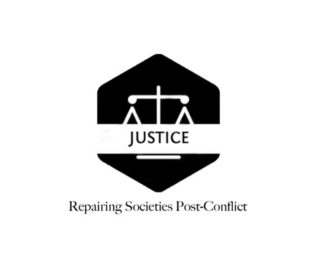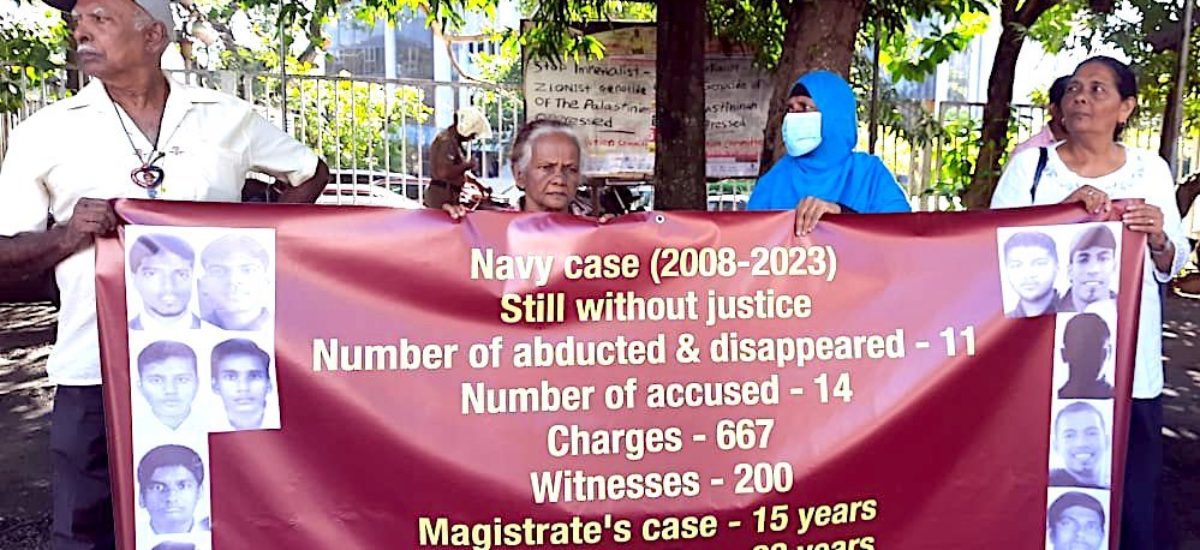Photo courtesy of Sri Lanka Brief
Successive government have promised that none of Sri Lanka’s “war heroes” would be tried for alleged war crimes and crimes against humanity. Former President Gotabaya Rajapaksa went as far as pardoning a convicted murderer in flagrant abuse of the justice system. Another case that illustrates the blanket impunity given to offenders is the case of the five boys and six men allegedly abducted and disappeared by Navy personnel and for the subsequent cover up that can be traced all the way up to former Navy commanders Admirals Wasantha Karannagoda and Ravi Wijegunaratne.
The Navy 11 case, as it has come to be known, has nothing to do with terrorism or terror suspects; it is a case of money. The 11 were abducted for ransom between 2008 and 2009 and in some cases, although the ransom was paid, the boys were never returned. For nearly two years after his abduction, one of the youths kept in touch with his parents through phone calls but after May 2011, the calls stopped.
A Navy informant, Mohammed Ali Anwar, also disappeared and is listed among the 11 missing. The others are John Ried, Roshan Lyon, Amanan Lyon, Rajeev Naganathan, Pradeep Vishwanathan, Thilakeswaram Ramalingam, Mohamed Sajid, Jamaldeen Dilan, Kasthuriarachchige Anton and Thygaraja Jegan.
In 2019, the International Truth and Justice Project in a report entitled The Sri Lankan Navy: A Collective Blind Eye gave a detailed account of the case after six years of investigations and many hours of interviews with witnesses including Navy personnel.
The details of the abduction for ransom case started with a complaint in May 2009 by Admiral Karannagoda to the police against his personal security officer Lieutenant Commander Sampath Munasinghe with whom he had fallen out. When Lieutenant Commander Munasinghe’s room was searched, four identity cards belonging to the missing men were found. He was arrested after a police investigation, which then boomeranged to include the Navy Commander as a suspect.
With the change of government in 2015, a new inquiry was launched after which, in 2019, 14 naval officers including the former Navy Commander were indicted. They were charged with 667 indictments for conspiracy, abduction with intent to secretly and wrongfully confine a person, wrongful confinement for the purpose of confinement, conspiracy to extort, extortion, giving false information and conspiracy to commit murder. But the Presidential Commission of Inquiry set up by President Gotabaya Rajapaksa to probe the alleged political victimisation of public servants under the previous administration ordered the Attorney General not to proceed with the case against Admiral Karannagoda.
In 2021, charges against the admiral were dropped and he was appointed governor of the North Western Province. The cases against the others are ongoing but no progress has been made on the legal front.
Head of the Families of the Disappeared, Britto Fernando, said that they had to take to the streets to plead for the case to be heard. Despite being called for a trial-at-bar three years ago, proceedings have been stalled due to Karannagoda’s political connections. “We think he is being treated in another way because of his political affiliations,” Mr. Fernando said.
Amnesty International called on the Attorney General’s Department to explain the reasons for its decision not to proceed with charges against Admiral Karannagoda.
“Sri Lanka has the world’s second highest number of enforced disappearances, with tens of thousands of people forcibly disappeared over many decades. This case was an opportunity for the Sri Lankan authorities to deliver justice for crimes under international law, by ensuring that those reasonably suspected of criminal responsibility, including those implicated for aiding and abetting and under command responsibility, are brought to trial,” said Yamini Mishra, Amnesty International’s Asia-Pacific Director.
“This case has already been beset by obstacles in the Sri Lankan Courts, and today’s decision pushes justice further out of reach for the families of victims. The AG’s department must explain the reasons for its decision, and Sri Lankan authorities must deliver truth, justice and reparations for all victims of enforced disappearance,” she said.
Earlier this year, the US barred Admiral Karannagoda from entering the country designating him as a gross violator of human rights due to his involvement in the case. The State Department confirmed that NGOs and independent investigations have documented the allegations of human rights violations by Admiral Karannagoda that it considered to be serious and credible.
“I have written letters to Mahinda Rajapaksa, Gotabaya Rajapaksa when he was the Defence minister and Maithripala Sirisena. But during these 15 years, there hasn’t been a single response from any government. Our only request is from the magistrate to hear the case out before they die or before we die,” said Jennifer Weerasinghe, mother of 17 year old Dilan who disappeared after attending a farewell party for another victim, Rajiv Naganadan, who was due to leave for studies abroad. Mrs. Weerasinghe believed that the Navy personnel was trying to abduct Rajiv, the son of a rich businessman, for ransom but because her son was in the car he was also taken along with three other boys.
“It has now been 15 years. The victims must have lost hope.They question whether justice would ever be served to them. We have seen that the people who are at fault were given diplomatic positions and promotions and some of the accused officers are still serving in the Navy,” pointed out lawyer Achala Senevirathna, who represented some families in the case.


